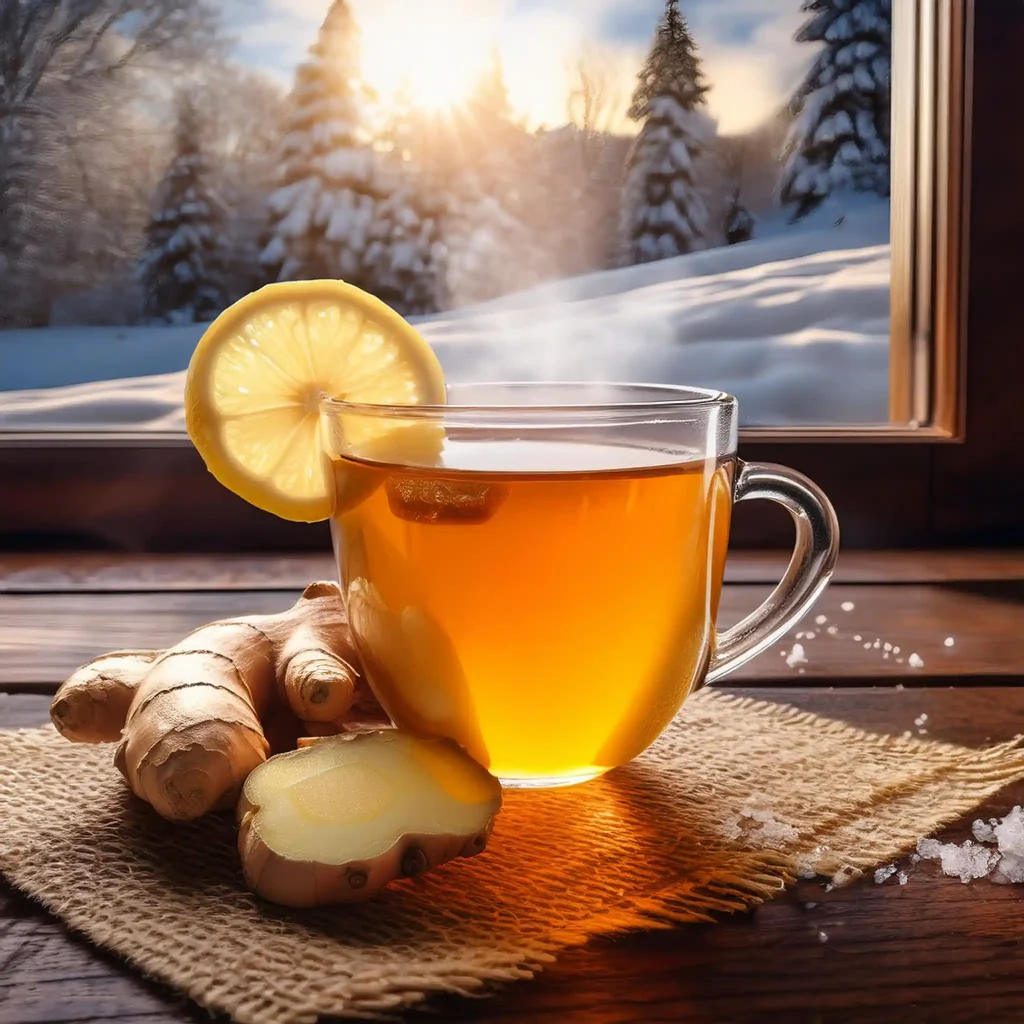As I sit down to write about ginger tea, I find myself making a warm cup of this aromatic beverage for myself. The scent of something sour and spicy floods the air, instantly taking me back to peaceful moments of concentration and perfect winter mornings. I have been counting on ginger tea’s comfort and health advantages for years; it has been a constant in my life. I will discuss my experience with ginger tea, its many health advantages, its fascinating past, and provide some advice for anyone wishing to start consuming this amazing tea.
The Beginnings: My Personal Experience with Ginger Tea
A few years back, during an especially hard winter, I fell in love with ginger tea. I was suffering from a stubborn cold, and nothing I tried helped. Ginger tea was suggested by a friend who attested to its extraordinary healing properties. I decided to test it nonetheless, despite my doubts.
I still remember how I made it the first time: I chopped up some fresh ginger root, boiled it in water, and then added a little honey and lemon juice. The first sip cleared my stuffy sinuses and soothed my sore throat, like a warm hug. My symptoms significantly improved over the next few days, and I became attached. Since then, ginger tea has become an important aspect of my routine, providing an enjoyable drink as well as a general health tonic and cure for colds.
The Health Benefits of Ginger Tea
In addition to being an enjoyable drink, ginger tea has many health benefits. Here is a closer look at what makes this tea different:
Digestive Health
One of ginger tea’s most well-known benefits is that it helps with digestion. Ginger has been used for many years to relieve abdominal discomfort, indigestion, and nausea. Gingerol and shogaol, two of its components, help the body to produce more digestive enzymes, which aids in the faster breakdown of meals. After eating, I found that sipping a cup of ginger tea helps reduce discomfort and sensations of fullness.
Anti-Inflammatory Properties
Substantial anti-inflammatory substances found in ginger have the potential to lessen pain and inflammation. People who suffer from arthritis or other inflammatory illnesses can especially benefit from this. I periodically get joint pain, and I have found that drinking ginger tea on a daily basis helps minimize inflammation and stiffness.
Immune Boosting
Ginger is high in antioxidants, which help to protect against illness while developing a stronger immune system. Regularly consuming ginger tea will naturally strengthen your immune system, increasing your ability to ward off common illnesses like the flu and colds. I have developed the habit of drinking ginger tea all winter long, and I have seen a noticeable drop in the frequency of my colds.
Relief from Menstrual Discomfort
Ginger tea can be a lifesaver for people who get menstrual cramps. Its pain-relieving and anti-inflammatory qualities aid in easing cramps and lessening discomfort. During that time of the month, I frequently grab a cup of ginger tea, which offers much-needed pain relief.
Weight Management
Ginger tea improves metabolism and increases feelings of fullness, which can help with weight management. Studies have found that ginger improves thermogenesis, the body’s process of burning calories to produce heat. Although it is not a miracle weight loss cure, adding ginger tea to a healthy diet and exercise program can help you achieve your weight management objectives.
The Rich History of Ginger Tea
The historical context of ginger tea is just as interesting and varied as its taste. Ginger is a native of Southeast Asia and has been utilized in traditional medicine and cooking for thousands of years. Let us go back in time to see how this unassuming root grew to become a worldwide phenomenon.
Ancient Beginnings
Ginger has been used for more than 5,000 years, starting in ancient China and India. Ginger was valued for its warming qualities in traditional Chinese medicine and used to cure a wide range of conditions, such as arthritis, colds, and digestive problems. Similarly, ginger was seen as a universal remedy in Ayurvedic medicine, where it was used to balance the body’s doshas (energies) and improve general health.
The Spice Trade
As a result of the spice trade, ginger became well-known throughout the Middle East, Europe, and beyond. Ginger was a common ingredient in European kitchens by the Middle Ages, and it was frequently used to make desserts like gingerbread. It was frequently traded like gold and other valuable commodities due to its extremely high worth.
Colonial Era
Ginger production expanded to the Caribbean during the colonial era, where it developed into a substantial revenue crop. Particularly in Jamaica, ginger grew to be a significant crop and was recognized for its strong flavor and superior quality. The popularity of ginger-based drinks like ginger ale and beer at this time also helped to establish the foundation for ginger tea’s current widespread popularity.
How to Make the Perfect Cup of Ginger Tea
The technique of making ginger tea is easy and satisfying. My go-to recipe for the ideal cup is as follows:
Ingredients:
- 1-2 inches of fresh ginger root
- 2 cups of water
- 1-2 teaspoons of honey (optional)
- A slice of lemon or lime (optional)
Instructions:
- Prepare the Ginger: Peel the ginger root first. The skin is easily scraped off with a spoon. After peeling, thinly slice the ginger.
- Boil the Water: In a small pot, boil two cups of water.
- Add the Ginger: To the boiling water, add the sliced ginger. Reduce the heat and let it simmer for 10-15 minutes, depending on how strong you like your tea.
- Strain the Tea: After simmering, strain the tea into a cup to remove the ginger pieces.
- Add Sweetener and Citrus: If desired, add honey to sweeten the tea and a slice of lemon or lime for an extra zing.
Enjoy your homemade ginger tea hot or let it cool and serve it over ice for a refreshing iced tea.
How to Incorporate Ginger Tea in Your Daily Routine
There are many ways you can enjoy and appreciate ginger tea. Take note of the following tips to get the most of this tasty drink:
Morning Boost
Drink a cup of ginger tea to boost your metabolism and sharpen your senses first thing in the morning. The zesty flavor and uplifting aroma are great for overcoming morning weariness.
Post-Meal Digestive Aid
After consuming food, sip ginger tea to help with digestion and avoid bloating. It works especially well after a hearty or rich dinner.
Cold and Flu Remedy
Grab some ginger tea as soon as you feel the first symptoms of a cold. Its ability to strengthen the immune system may help minimize the intensity and length of your symptoms. Its therapeutic qualities can be improved by adding a clove of garlic or a pinch of turmeric.
Relaxation Ritual
To help you de-stress at night, incorporate some ginger tea into your routine. After a hard day, the warm, calming properties of ginger might help you relax.
Experiment with Flavors
Without hesitation, try experimenting with various flavors and elements. Cardamom, cinnamon, and fresh mint can all enhance the flavor of ginger while providing their own special advantages.
Ginger Tea Around the World
Around the world, ginger tea is consumed in a variety of ways, with each culture lending its own special flavor. Here are a few major examples:
- Masala Chai (India): Ginger plays a major role in masala chai, an Indian spicy drink brewed with milk, black tea, and a mixture of spices like cloves, cinnamon, and cardamom. The popular drink masala chai is known for its uplifting and warming qualities.
- Ginger Lemon Tea (Japan): Ginger tea is often served with a squeeze of fresh lemon juice in Japan. This straightforward but refreshing concoction is a family favorite in Japan and a common cold cure.
- Jamaican Ginger Tea: Chopped ginger root and brown sugar are common ingredients in Jamaican ginger tea. In addition to being a popular hot or cold drink, it is also well-known as a treatment for digestive problems.
- Ginger and Honey Tea (China): Ginger slices are typically cooked in water and then sweetened with honey to make ginger tea in China. During the winter, this traditional drink is frequently consumed to help boost the immune system and fend off the cold.
The Future of Ginger Tea
Ginger tea is becoming more and more popular as more people look for alternative cures and wellness solutions. It is a traditional beverage that will probably continue to be a favorite for many generations to come because of its adaptability, health advantages, and delicious flavor. Ginger tea is set to become a mainstay in more homes worldwide as interest in herbal teas and natural health products grows.
For me, ginger tea has transformed from a drink to a loving ritual, a comfort, and a means of achieving greater health. I advise you to learn about the benefits of ginger tea, irrespective of your level of experience with herbal infusions. Try out many recipes, enjoy its lengthy history, and take advantage of its many benefits.
Including ginger tea in your daily routine can be a small but important step in the direction of a more healthy and well-rounded lifestyle. So why not make yourself a cup of ginger tea right now and become one of the many people who have experienced its magic? Improvements will be felt in both your body and mind.

